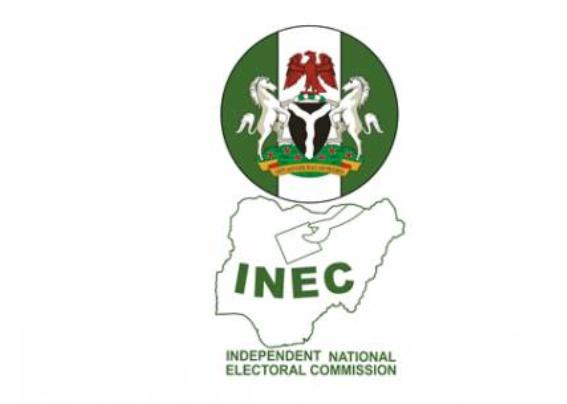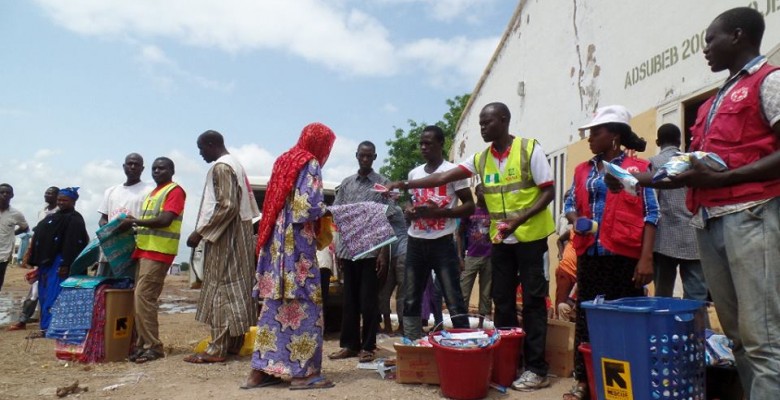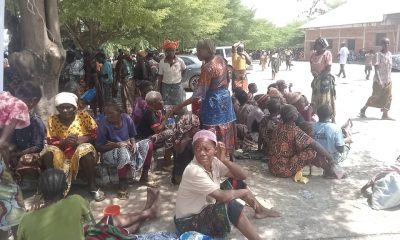NEWS
Benue IDPs Threaten Legal Action Over Imminent Exclusion From INEC’s CVR

By Ubong Ukpong, Abuja
Internally Displaced Persons, (IDPs), in Benue state have threatened legal action against the Independent National Electoral Commission, (INEC), over their imminent exclusion from the ongoing Continuous Voters’ Registration (CVR), exercise.
The IDPs, have therefore, issued 21 days ultimatum to INEC, within which the Commission shall ensure special arrangements at their various camps, to enable them register, or risk litigation.
The IDPs are from six council wards of Uvir, Mbadwem, Mbabai, Mbayor-Yandev, Mbawa and Nyiev, all in Guma Local Government Area of Benue state.
Their demands were contained in a 12-paragraph- petition dated September 24, 2021, with title, “Re: Continued Disenfranchisement of Internally Displaced Persons From Guma LGA of Benue State”, through their representative and former Commissioner for Lands and Survey in the state, Hon.
Hon Tondu, in the petition signed by him on behalf of the people, said, “I have the mandate of the aforementioned IDPs and my people in general to bring to your immediate attention for necessary action, the fact that the Internally Displaced Persons Camps in Benue state and their inhabitants are being completely shut out of our country’s political processes because they are not part of the ongoing Continuous Voters’Registration exercise.
“As you are also aware, many Nigerian citizens of Benue state origin were forced into IDPs camps within the state because of frequent bloody internal conflicts which occasioned the prevailing climate of insecurity in the state.
“You will agree with me that those persons unfortunately displayed from their homes are still entitled to vote and be voted for, not withstanding their current residential status”, Tondu said, insisting that it was the responsibility of INEC to ensure that the IDPs are registered as voters and are not disenfranchised through discriminatory implementation of INEC policies.
He recalled that in the run up to 2019 general elections, eligible voters in the IDPs Camps in Benue state were not afforded the opportunity to participate in the CVR exercise, and thus, were unable to exercise their franchise during the election.
“Now the INEC is conducting another Voters registration for purpose of the 2023 general elections, and once again persons eligible for registration as voters but who currently reside in the IDPs camps are being excluded from the process as no special arrangements whatsoever have been made to ensure their registration as voters and the inclusion of their names in the updated voters register.
“Facilities to enable online registrations are non-existent in the IDPs camps at the moment. Even if such facilities were to be made available in the IDPs camps, it is a common fact that the level of illiteracy, including computer illiteracy, is very high in Nigeria. It could be safely estimated that 75 percent to 80 percent of those in the IDPs camps in Benue state are illiterates, who would find it extremely difficult, if not impossible, to manipulate smart phones or computers in order to fill online soft copies of the registration forms to initiate or conclude their voters’ registration process.
“In the light of the foregoing, I call on INEC to make immediate special arrangements to take the ongoing Continuous Voters Registration exercise to all the IDPs camps hosting Nigerians from Uvir, Mbadwem, Mbabai, Mbayor-Yandev, Mbawa and Nyiev.
“Please take notice that if no special arrangements are put in place by INEC within 21 days, we shall be constrained to have recourse to the judicial system and take legal steps to ensure that the Commission is compelled to register and include in the voters register every Nigerian citizen from the aforementioned Council Wards in the IDPs camps in Benue state”, Tondu warned.
The petitioners want registration centres for physical registrations of voters deployed to the IDPs camps in the state, believing that this was the only way to guarantee that the IDPs are given the opportunity of exercising their franchise in the forthcoming elections, so that they could freely choose their political Representatives.
NEWS
Breaking: George Akume remains SGF – Presidency

The presidency says there has been no change in the status of Senator George Akume, as Secretary to the Government of the Federation.
This is according to a statement by Special Adviser to the President on Information and Strategy, Bayo Onanuga.
Mr Onanuga says President Bola Tinubu, currently in Saint Lucia, has not made any new appointments.
He described the information circulating about Akume’s replacement as untrue, adding that agents of mischief fabricated it.
GeorgeAkume
sgf
NEWS
Diri Campaigns Against Drug Abuse, Trafficking

From Mike Tayese, Yenagoa
Bayelsa State Governor, Sen. Douye Diri yesterday, led a campaign against drug abuse and illicit trafficking as part of activities commemorating the International Day Against Drug Abuse and Illicit Trafficking.
Diri advised people of the state, particularly the youths, to shun hard drugs and trafficking of illicit substances, saying they were harmful to their health and to the society.
The Bayelsa governor, who spoke shortly after the weekly Prosperity Walk exercise at the Samson Siasia Sports Complex in Yenagoa, also urged youths to develop themselves by acquiring a skill and work towards actualising their God-given potential.
“We just completed a nine to 10km walk, which is a test of our fitness. As it is said, health is wealth.
“Today is the International Day Against Drug Abuse and Illicit Trafficking. We are not only observing the global campaign, we are also leading it here in Bayelsa.
“No one in his right senses goes to commit crime and violent acts except that individuals are under the influence of hard drugs. My advice to youths is to be self-confident, have the fear of God and develop your innate potential for you to become a star.”
He implored youths to emulate the shining example of a Bayelsa-born United States-based athlete, Victory Godah, who was discovered through the state’s sports programmes.
He commended her gesture of donating sporting equipment as a way of giving back to the state.
“Victory Godah from Ekeremor local government area was discovered here and because of her skill, she is now at the University of Minnesota, United States. She has given back to the state through sports equipment so that more of us can have that access.”
In his remarks, the Commissioner for Health, Prof. Seiyefa Brisibe, emphasised the importance of the weekly walk, stating that participants above 40 years would have their blood pressure controlled after taking about 5,000 steps.
Also, state chairman of the Drug Abuse, Addiction, Prevention and Rehabilitation Committee, Dr Peter Owonaro, said the committee’s outreach in the state had been a huge success, noting that a recent research indicated that the drug abuse prevalence rate in Bayelsa dropped by five per cent from 21.4 per cent.
Also, the state commander of the National Drug Law Enforcement Agency (NDLEA), Kanu Sunny, lauded the state government for its unprecedented support in the fight against drug abuse and trafficking.
He said the campaign was taken to secondary schools as well as tertiary institutions and encouraged all to join in the war against the menace.
Foreign News
Ally of Cameroon President, 92, Quits ‘Broken’ Government to Challenge Him

Issa Tchiroma Bakary – a prominent minister and long-time ally of President Paul Biya – has quit Cameroon’s government, in the hope of ending 92-year-old Biya’s four-decade grip on power in upcoming elections.
Just four months before the central African nation went to the polls, Tchiroma said the Biya administration he belonged to had “broken” public trust and he was switching to a rival party.
“A country cannot exist in the service of one man,” he said on Wednesday.
While he was communications minister, Tchiroma notably came under fire for denying – then backtracking on his denial – that Cameroonian soldiers had killed women and children in a viral video.
His other roles during almost two decades in government include being a spokesman for the Biya government, and, until his resignation on Tuesday, he was employment minister.
Paul Biya – the world’s oldest head of state – has yet to confirm if he will attempt an eighth term as president. Last year, the country banned reports on the president’s health following rumours he had died.
As this election approaches, high unemployment and soaring living costs are of concern to many Cameroonians, as are corruption and security. A separatist insurgency in the English-speaking provinces as well as jihadists operating in the northernmost region have forced many thousands of Cameroonians from their homes in the past decade.
Cracks in Tchiroma’s relationship with President Biya were blown open earlier this month, when he told crowds in his home city of Garoua that Biya’s time in power had not benefited them in any way.
Tchiroma, widely reported to be 75, continued this criticism in a 24-page manifesto released a day after his resignation – promising to dismantle “the old system” so that Cameroon could move beyond “abuse, contempt, and the confiscation of power”.
One of his proposed solutions is federalism – he is offering to hold a referendum on devolving more power to Cameroon’s 10 provinces. This has long been mooted by many as a solution to the country’s so-called Anglophone crisis.
Specifically addressing English-speaking Cameroonians, who have long complained of marginalisation and discrimination in Francophone-dominated public institutions, he said “you do not need people to speak for you – you need to be listened to” and that “centralisation has failed”.
Tchiroma also used his manifesto to say Cameroon “has been ruled for decades by the same vision, the same system. This model, long presented as a safeguard of stability, has gradually stifled progress, paralysed our institutions, and broken the bond of trust between the state and its citizens”.
As the October presidential election approaches, rights groups have condemned the government’s crackdown on dissent.
Shortly after Tchiroma announced his plans to run for the presidency, the government reportedly announced a ban on all political activities by his Cameroon National Salvation Front (CNSF) party in a sub-district of the Far North region – a part of the country where he is said to be an influential power-broker.
Weeks earlier, fellow presidential hopeful Maurice Kamto had his movements curtailed during a two-day police stakeout in Douala, after promising supporters at a rally in Paris that he would protect Biya and his family if he wins in October.
Parliamentary elections that were also supposed to take place earlier this year have been delayed until 2026.
Reaction to Tchiroma’s presidential bid has been mixed – some think he is canny.
“By positioning himself as the elder statesman who ‘saw the fire coming’, Tchiroma is hedging that his break with Biya will be seen as bold – not opportunistic,” Cameroonian analyst and broadcaster Jules Domshe said.
“From economic fallout to youth unemployment, insecurity, and growing unrest in the North-West, South-West, and Far North [regions], Cameroon is ripe for change.”
Opposition voices are divided – some want Tchiroma to support Kamto, who was the runner-up in 2018 with 14% of votes. But others say he is tainted by his long association with Biya.
“He cannot embody change… He was part of the system for too long. The youth do not trust him,” says Abdoulaye Harissou, a legal notary and prominent critic once detained by the government.
Another member of the opposition – Jean Michel Nintcheu of the APC coalition – simply said: “We don’t see Tchiroma as a potential winner.”
| ReplyReply allForwardAdd reaction |

























